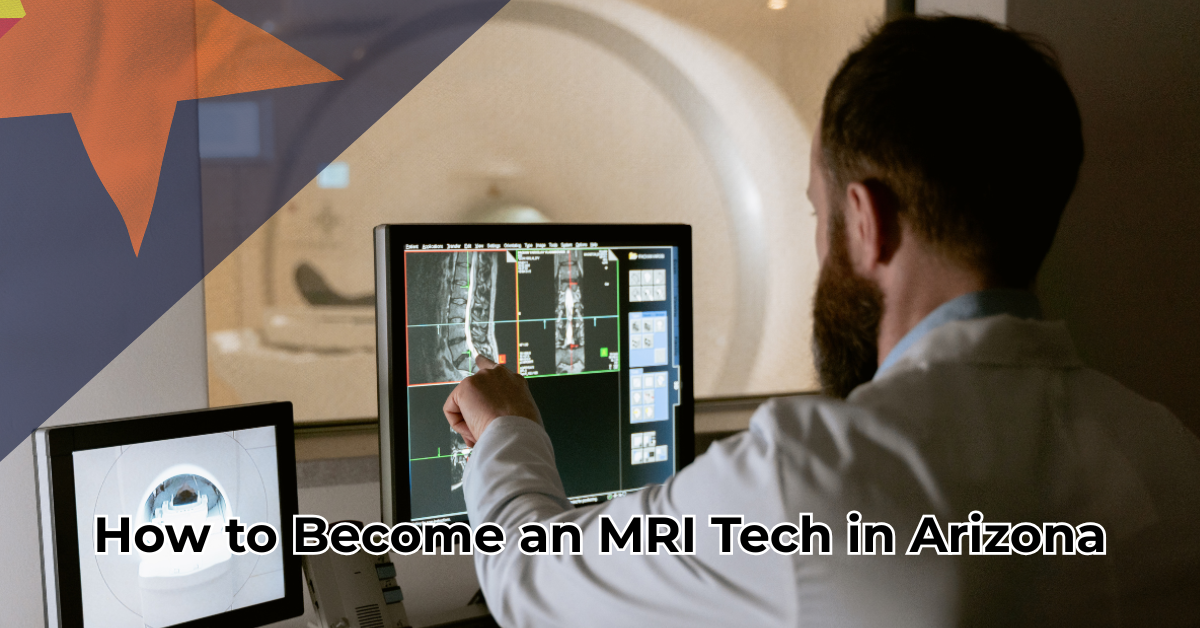One of the fastest-developing areas within healthcare is Magnetic Resonance Imaging (MRI) technology, with its stable careers, attractive salaries, and the chance to assist patients directly.
Arizona, and its growing healthcare industry and need for skilled imaging practitioners, is one of the most suitable states to begin this profession in 2025. Being an MRI tech is a dream job in Arizona, both as a high school graduate seeking a career, as a healthcare professional seeking a specialization, and as a person eager to make a career shift.
Arizona MRI techs have access to the latest imaging devices, are closely involved with physicians, and assist in the diagnosis of serious health conditions.
As hospitals, outpatients, and diagnostic facilities are increasing in Phoenix and Tucson, Mesa, and other cities, MRI techs are in high demand. The road leading to this career includes going through education, getting certification and clinical training requirements, which is also possible in a step-by-step manner.
Education Pathways and Top MRI Tech Schools in Arizona 2025
The initial move towards qualifying as an MRI technologist in Arizona is taking a formal education course. The majority of employers insist on an associate degree in Radiologic Technology or Magnetic Resonance Imaging, with bachelor’s degrees sought by a few to gain higher levels of employment. Depending on the level of study, programs are usually 18 months or 4 years.
Arizona has a number of accredited MRI training programs available to students in both community colleges and universities. Most schools offer practical clinical placements in collaboration with local healthcare facilities and imaging centres.
The accreditation of the Joint Review Committee on Education in Radiologic Technology (JRCERT) is paramount as it grants high-quality education and admits to national certification exams.
Top Options for MRI Tech Education in Arizona (2025):
- Pima Medical Institute (Phoenix and Tucson campuses): Offers an associate degree in Radiography, followed by MRI specialization.
- GateWay Community College (Phoenix): Provides radiologic technology programs with clinical training across Arizona healthcare systems.
- Northern Arizona University: Offers advanced imaging courses and bachelor-level programs for students seeking leadership roles.
Completing your education in an accredited program ensures you are well-prepared for certification exams and clinical work, making you a strong candidate in Arizona’s competitive healthcare job market.
Certification and Licensure Requirements in Arizona, including ARRT
After completing your education, the next milestone is earning certification. In Arizona, most MRI technologists obtain credentials from the American Registry of Radiologic Technologists (ARRT). The ARRT certification demonstrates professional competence and is often a requirement for employment.
Steps for Certification and Licensure in Arizona:
- Complete an Accredited Program: Must be JRCERT-approved.
- Pass the ARRT Examination: This test covers MRI safety, procedures, patient care, and imaging protocols.
- Maintain Certification: ARRT requires ongoing continuing education credits every two years.
- Apply for Arizona State Licensure: While Arizona does not require a separate state license for MRI-only technologists, most employers expect ARRT certification as the standard.
Many employers in Arizona, especially large healthcare systems like Banner Health, Mayo Clinic, and HonorHealth, give hiring preference to ARRT-certified candidates. In addition, some facilities may request Basic Life Support (BLS) or CPR certification to ensure patient safety during procedures.
Certification not only validates your skills but also increases earning potential and provides flexibility to work in multiple imaging specialities if desired.
Clinical Training, Required Hours and Skills You Must Master
Hands-on clinical training is a critical part of becoming an MRI tech in Arizona. While classroom instruction builds theoretical knowledge, clinical rotations ensure that students gain practical experience operating MRI scanners, working with patients, and collaborating with healthcare teams.
Typical Clinical Training Requirements:
- Hours: Most MRI programs in Arizona require between 1,000 and 1,500 clinical hours. These hours are completed in hospitals, outpatient centres, and diagnostic imaging facilities.
- Skills Mastered: Patient positioning, contrast injection protocols, MRI safety procedures, image optimization, and communication with radiologists.
- Safety Focus: Students learn to follow strict MRI safety standards, especially regarding the magnetic environment and patient screening.
Other soft skills that students gain during the clinical rotations include problem-solving, empathy, and effective communication. These are equally worthwhile as technical competence since MRI technologists may encounter patients who are anxious or in pain.
Healthcare services in Arizona, such as Banner University Medical center and Phoenix Children’s Hospital, collaborate with schools to give this much-needed practical training. By the time students have graduated, they are ready to move to full-time positions smoothly.
Salary, Job Outlook and Top Employers in Arizona 2025
MRI technologists in Arizona enjoy strong job stability and excellent earning potential. According to the most recent 2025 data, the average salary for MRI techs in Arizona is approximately 86,000 dollars per year, with experienced professionals earning over 95,000 dollars annually in metropolitan areas such as Phoenix and Scottsdale. Entry-level salaries typically start around 62,000 dollars.
Job Outlook in Arizona:
- The demand for MRI techs is projected to grow by 6 to 8 per cent through 2030, faster than the average for most professions.
- Arizona’s aging population and expansion of advanced medical facilities drive this demand.
- Rural areas like Yuma and Flagstaff also need trained MRI technologists, giving professionals the flexibility to choose their work location.

Top Employers for MRI Techs in Arizona (2025):
- Banner Health
- Mayo Clinic Arizona
- HonorHealth
- Dignity Health
- Phoenix Children’s Hospital
With hospitals and diagnostic centres expanding services, job opportunities are plentiful. Professionals who pursue advanced certifications or cross-train in CT and other imaging modalities often find the highest-paying roles in the state.
Step-by-Step Timeline and Practical Tips to Launch Your MRI Tech Career
Becoming an MRI technologist in Arizona follows a clear and achievable timeline. On average, it takes 2 to 4 years, depending on the educational path you choose. Here is a practical breakdown:
Step-by-Step Timeline:
- High School Preparation (Year 0 to 1): Focus on science subjects like biology, physics, and math.
- Enroll in an Accredited Program (Year 1 to 3): Complete an associate or bachelor’s degree in radiologic technology or MRI.
- Complete Clinical Training (Years 2 to 3): Fulfil 1,000 to 1,500 clinical hours in Arizona healthcare facilities.
- Earn ARRT Certification (End of Year 2 or 3): Pass the national exam to become certified.
- Begin Employment (Year 3 to 4): Apply for jobs in hospitals, diagnostic centres, or outpatient clinics.
- Advance Your Career (Ongoing): Consider cross-training in CT or pursuing leadership roles for higher salaries.

Practical Tips for Success:
- Network with Arizona healthcare professionals during clinical rotations.
- Stay updated with the latest MRI technology and safety guidelines.
- Join professional groups such as the Arizona Society of Radiologic Technologists for support and career opportunities.
- Keep learning through continuing education to maintain ARRT certification and stay competitive in the field.
Following this timeline ensures a smooth transition from student to certified MRI tech while positioning you for long-term success in Arizona’s growing healthcare industry.
Conclusion
Being an MRI technologist in Arizona in the year 2025 would be a viable and fulfilling career. Having accredited programs, a large number of clinical opportunities to be trained, and the necessity of qualified specialists, the state provides a good place to develop a career.
When you have completed the right education, obtained the ARRT certification, and learned how to handle technical and patient care management, you will be able to create a stable and well-paying career in the medical imaging industry.
Desire to work in Phoenix, Tucson or other smaller communities in Arizona, MRI technology will not only offer you financial stability but will also make you feel good to be benefiting a patient with advanced diagnostic care.
FAQs
How much do MRI techs make in AZ?
In 2025, MRI technologists in Arizona earn an average of 86,000 dollars per year, with entry-level pay starting near 62,000 dollars and experienced techs exceeding 95,000 dollars annually.
What is the fastest way to become an MRI tech?
The quickest route is completing an 18 to 24-month accredited associate program in MRI or radiologic technology, followed by ARRT certification to qualify for jobs.
How long does it take to train in MRI?
Most MRI technologists in Arizona complete their training in 2 to 3 years, which includes classroom education, clinical rotations, and certification exams.
What degree should I get for an MRI tech?
An associate degree in radiologic technology or MRI is the standard entry requirement, while a bachelor’s degree may open doors to leadership or specialized imaging roles.

